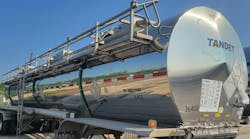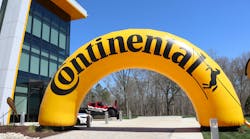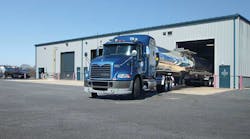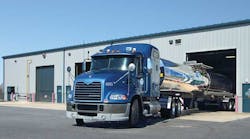SUPERIOR Carriers’ management team spent years looking for the perfect southeastern location for a new tank wash rack. They determined that Greer, South Carolina, was the right place.
The Greer wash rack grew out of a 10 year strategic plan developed by Superior Carriers, a division of Superior Bulk Logistics Inc, which is headquartered in Oak Brook, Illinois. Even as the Greer wash rack project was wrapping up, the tank truck carrier moved forward with development of another new wash rack in High Point, North Carolina.
“We are definitely expanding our capabilities in the southeast to support our customers”, says Brian Nowak, President of Superior Carriers. “The Greer wash rack is busier by the day, and construction of the High Point wash rack is now in the final stages.”
“We spent a lot of time evaluating possible tank wash locations, and we determined that our Greer terminal was the best place in strategic terms. It is at the crossroads of I-85 and I-26, and we have eight terminals within a 300 mile radius.”
“We believe the Greer wash rack can handle the cleaning needs of more than just those eight terminals. We’re doing some tank cleaning for other carriers. We’ll continue to add services at the Greer wash rack including possible foodgrade cleaning.”
Cleaning Versatility
The three-bay chemical wash rack in Greer can handle 300 plus tank trailers a month to start. Surfactants account for a large percentage of the products cleaned, but the wash rack can handle a wide range of chemicals, including latex and resins.
“We’ll clean just about anything hauled in our company’s trucks,” says Brian Ivey, Superior Carriers’ Greer Tank Wash Supervisor. “We won’t clean any high-hazard products such as poisons or toxic by inhalation.”
Constructed over a 14-month period, the facility began cleaning tank trailers in March 2015. Two shifts keep the wash rack running 16 hours a day, six days a week.
The wash rack sits on a fully paved and fenced 19-acre site that Superior Bulk Logistics purchased in 2003. The property previously served as a terminal for a large flatbed and van fleet operator.
In addition to the wash rack, the location includes an 8,000 square foot building with offices for Superior Carriers’ Greer terminal staff, as well as additional offices and classrooms for Superior Bulk Logistics’ Training & Development Center. A five-bay maintenance shop built by the previous owner, and now upgraded, rounds out the facility infrastructure.
“All drivers and terminal management staff from throughout Superior Bulk Logistics and its subsidiaries are sent to the Training & Development Center when they join the company and when retraining is needed,” according to Richard P (Phil) Henderson, Superior Carriers Greer terminal manager. The maintenance shop handles a wide range of vehicle service and repair work including cargo tank testing and inspections.
Superior Team
A general contractor was brought in to build the steel building that houses the wash rack. Beyond that, Superior Bulk Logistics employees performed or managed the design, fabrication, and installation of the hardware and systems used in the wash rack.
“The Greer wash rack project represented the first time that we had gathered all of the knowledge in-house to build such a state-of-the-art facility from the ground up acting as our own cleaning rack contractor,” Nowak says. “We wanted full control over the construction of the wash rack. Our folks had already built the cleaning solution vats for four other Superior Bulk Logistics locations, and they built the equipment for the new High Point wash rack.”
The wash rack development team assembled by Superior Bulk Logistics included Charles “Smitty” Smith, operations project manager, and David “Smokey” Burgess, Superior Carriers central region fleet manager, who worked together to oversee assembly and installation of the wash system and hardware. Also participating were John Frame, tank shop manager at the High Point terminal, and Roy Ingram, a code welder at the High Point terminal tank shop.
It took about nine months for the team to fabricate and assemble the work platforms, mezzanines, cleaning vats, and even the floor drains. Most of the fabrication work was done at the High Point terminal.
Vat System
Superior Carriers chose a vat-style wash system consisting of five 1,500-gallon stainless steel vats containing fresh hot water, fresh cold water, detergent, caustic, and recycled water. All of the piping used in the system is stainless steel, and the vats are manifolded together and connected to 40-horsepower stainless steel Grundfoss vertical pumps that can run Sellers spinners at all three wash bays simultaneously. The multi-stage pumps are rated at a maximum of 400 psi and 110 gallons per minute.
Three-inch Wilden air-operated double diaphragm pumps with Blacoh pulse dampeners return cleaning solutions to the vats at up to 230 gallons per minute. Exterior vehicle washes are handled by a Landa pressure washer system rated at 3,200 psi.
Hot water and steam for the cleaning operations come from one of two 50 horsepower Miura vertical boilers. “These are very economical boilers to operate, and they produce very dry steam,” Ivey says. “With our current cleaning load we run just one boiler at a time, but the other is on standby. We have more than enough boiler capacity to handle the addition of foodgrade cleaning.”
After cleaning, tank interiors are dried by a Zeks heated desiccant dryer that moves air at a rate of 600 cubic feet per minute. The air is filtered through a .01 micron inlet filter and .1 micron outlet filter.
“We use the desiccant dryer to thoroughly purge moisture from a tank trailer,” Ivey says. “It is rated for a -40 degree dew point. The interior of the tank is completely dry and does not sweat. We seal up every trailer after cleaning.”
Discharge water is routed to a 13,000 gallon storage tank prior to being hauled away for off-site treatment and disposal. Superior Carriers uses its own tank trailers to haul away the waste water.
Heels are closely monitored. Anything more than five gallons requires management approval.
Controlled Process
Cleaning operations from start to finish are controlled and monitored from computer workstations on the mezzanines and on the floor. The system runs Advanced Control Technology software.
“This is Superior Carriers’ first ‘fully automated’ wash rack,” Ivey says. “We track every tank cleaning job we do and we record every step taken with each cleaning. However our wash rack workers do not follow pre-set recipes. We give each trailer a custom clean even if it contains the easiest of products to clean. We don’t take any shortcuts in the cleaning process.”
The importance of carefully following procedures is stressed constantly during the training of new workers. “We started from the ground up with the staff for this wash rack,” Ivey says. “Of the seven workers we hired at the startup of this wash rack, only one had prior tank cleaning experience.”
Over the years, with many wash rack locations, Superior has developed extensive training procedures that the company follows in detail.
The training process enhanced during the initial staffing of this wash rack evolved into a four to six week new-hire orientation. A worker learns the tank cleaning process in individual steps. They start on the ground draining heels and removing tank trailer hardware.
Once comfortable with those steps, they are moved to the top of the tank. The emphasis is always on safe operating practices as a priority.
“A new hire always works with a partner,” Ivey says. “Once they learn the basics of the operation, we begin teaching them about the cleaning process itself. Learning to clean each product is the biggest challenge. We clean so many different products. The training really never ends.”
Confined Space
Confined space entry is a big part of the job, and it gets plenty of attention. All tank interiors are inspected after cleaning, and all wash rack workers participate in confined space entry operations.
For new hires, training starts with computer instruction and includes testing with each phase of the training. Instruction covers three aspects of confined space entry: entrant, attendant, and supervisor.
“We can qualify someone as an attendant or entrant in two full days of training,” Ivey says. “It might take six months for someone with no experience to qualify as a confined space entry supervisor.”
Confined space entry training is a shared function with the maintenance shop at the Greer terminal. The wash rack crew participates with the Greer terminal mechanics and dispatchers on confined space rescue drills and annual retraining. Local fire departments also participate in the drills.
Three trained individuals must be present for every confined space entry, and all confined space entries at the wash rack are permit-required. Tanks have been cleaned, but product residue may be present.
“We believe we have the systems and people in place to provide the very best in tank cleaning at this wash rack,” Ivey says. “The ultimate goal of this facility is to clean tank trailers as safely as possible with the absolute best quality for our customers.” ♦










